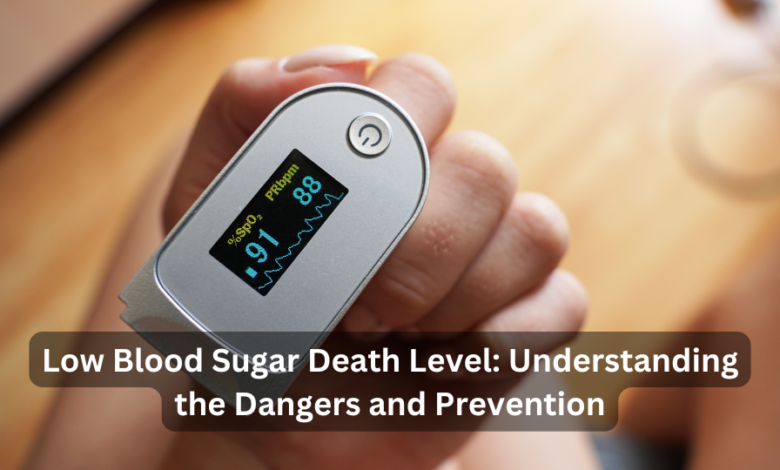Low Blood Sugar Death Level: Understanding the Dangers and Prevention

Low blood sugar, also known as hypoglycemia, is a condition that occurs when blood glucose levels drop below the normal range, typically less than 70 mg/dL. While this may sound like a manageable issue, severe hypoglycemia can lead to serious complications, including loss of consciousness, seizures, and in extreme cases, death. Understanding the critical thresholds, the causes, symptoms, and prevention methods are vital in managing hypoglycemia effectively, especially for those living with diabetes.
In this comprehensive guide, we will explore the low blood sugar death level, the body’s response to hypoglycemia, and how to prevent this dangerous condition.
What is Hypoglycemia?
Hypoglycemia refers to dangerously low levels of glucose in the blood. Glucose is the primary fuel for the body, especially the brain, and a lack of it can cause immediate symptoms like dizziness, confusion, and fatigue. When the body’s blood sugar drops to extremely low levels—generally below 55 mg/dL—there is a heightened risk of hypoglycemic coma, which could ultimately result in death if not addressed promptly.
Symptoms of Low Blood Sugar:
- Shaking or tremors
- Excessive sweating
- Rapid heartbeat
- Dizziness or confusion
- Slurred speech
- Blurred vision
At lower levels—especially below 20 mg/dL—the body can no longer function, leading to unconsciousness, seizures, and potentially death. This is commonly referred to as the low blood sugar death level.
How Low Can Blood Sugar Go Before Death?
Understanding the “death level” of low blood sugar is crucial, particularly for people with Type 1 or Type 2 diabetes who use insulin or other medications to lower blood sugar levels. Generally, blood glucose levels below 40 mg/dL can cause severe complications, including death, if untreated. However, levels between 10 mg/dL to 20 mg/dL are considered critical and life-threatening. These dangerously low levels can result in a hypoglycemic coma or irreversible brain damage.
According to several studies and healthcare professionals, death is more likely to occur when blood sugar levels drop below 10 mg/dL and are left untreated for an extended period.
Causes of Severe Hypoglycemia
While hypoglycemia can affect anyone, individuals with diabetes are at the highest risk. Several factors can trigger severe hypoglycemia:
- Excessive Insulin Use: Over-administration of insulin or insulin-like medications is the leading cause of severe hypoglycemia. This often happens due to miscalculated doses or mismanagement of insulin in relation to food intake.
- Skipping Meals: Skipping meals after taking insulin can create an imbalance, leading to dangerous drops in blood sugar.
- Increased Physical Activity: Exercising without adjusting insulin doses or consuming extra carbohydrates can result in a rapid decline in blood glucose.
- Alcohol Consumption: Excessive alcohol intake can interfere with the liver’s ability to release glucose into the bloodstream, increasing the risk of hypoglycemia.
- Underlying Health Conditions: Certain conditions, like kidney disease, can hinder the body’s ability to regulate blood sugar, increasing the risk of hypoglycemia.
The Biological Response to Hypoglycemia
When the body detects low glucose levels, it triggers a series of mechanisms to try and raise blood sugar back to normal. The adrenal glands release epinephrine (adrenaline), causing symptoms like shaking, sweating, and a rapid heartbeat. The body also releases glucagon, a hormone that signals the liver to release stored glucose into the bloodstream.
However, in severe hypoglycemia, these mechanisms may fail, particularly in individuals with long-standing diabetes. Repeated episodes of hypoglycemia can cause hypoglycemia unawareness, where the body loses its ability to recognize the early warning signs of low blood sugar.
Preventing Low Blood Sugar from Reaching Dangerous Levels
Prevention of severe hypoglycemia involves diligent blood sugar monitoring and proper management strategies. Here are some key measures that can help prevent low blood sugar from reaching dangerous or fatal levels:
- Frequent Blood Sugar Monitoring: Regularly checking blood glucose levels is crucial for people with diabetes. The use of continuous glucose monitors (CGMs) can provide real-time data on blood sugar trends, helping individuals detect low blood sugar early.
- Adjusting Medication Dosages: It’s essential to tailor insulin or other diabetes medications based on meal timings, physical activity, and blood sugar readings.
- Carbohydrate Intake: Carrying fast-acting carbohydrates (like glucose tablets or juice) is an important practice for people prone to low blood sugar levels. It helps raise blood glucose quickly in case of an unexpected drop.
- Meal Planning: Structured meal timings with balanced carbohydrate intake can prevent blood sugar fluctuations.
- Avoiding Excessive Alcohol: Limiting alcohol consumption, particularly on an empty stomach, can significantly reduce the risk of hypoglycemia.
- Consulting Healthcare Providers: Regular consultations with a diabetes care team are critical for adjusting treatment plans and minimizing the risk of severe hypoglycemia.
What to Do in Case of Severe Hypoglycemia
Immediate treatment is crucial when blood sugar levels fall too low. The recommended course of action includes:
- Consume 15 Grams of Fast-Acting Carbohydrates: This can be in the form of glucose tablets, a small amount of juice, or sugary snacks. Check blood sugar again after 15 minutes to ensure it’s rising.
- Administer Glucagon: If the individual is unconscious or unable to swallow, a glucagon injection should be given immediately. This will help the liver release glucose into the bloodstream.
- Call Emergency Services: In cases of severe hypoglycemia, especially if the person loses consciousness or has a seizure, emergency medical help is necessary.
Failure to treat hypoglycemia promptly can lead to long-term complications, such as brain damage, and in worst-case scenarios, death.
Long-Term Consequences of Low Blood Sugar
Frequent episodes of severe hypoglycemia can have serious long-term consequences:
- Cognitive Decline: Research has shown that repeated episodes of severe hypoglycemia can lead to memory problems and cognitive impairment, as the brain is highly sensitive to glucose deficiency.
- Cardiovascular Risks: Severe hypoglycemia can trigger a stress response, increasing blood pressure and heart rate, which may elevate the risk of heart attacks and strokes over time.
- Hypoglycemia Unawareness: With recurrent low blood sugar events, the body’s ability to recognize the early symptoms of hypoglycemia diminishes. This condition, known as hypoglycemia unawareness, makes it more difficult to detect low blood sugar until it reaches a dangerous level.
- Coma and Death: At extremely low levels, blood sugar deprivation can cause coma and lead to death if not treated urgently.
How to Manage Hypoglycemia for a Safe and Healthy Life
Prevention and management of low blood sugar are paramount, especially for those with diabetes. Developing a robust plan with your healthcare provider is essential to maintaining safe blood glucose levels and avoiding the low blood sugar death level. Here are the steps we recommend:
- Personalized Diabetes Management Plans: Work closely with your healthcare provider to develop a personalized diabetes management plan that suits your lifestyle, including insulin adjustments, diet modifications, and activity levels.
- Emergency Preparedness: Always carry emergency glucose supplies, such as glucose gel or glucagon, to prevent serious hypoglycemic events.
- Education and Awareness: Educate yourself and those around you about the symptoms and risks of hypoglycemia. Ensure that family, friends, and coworkers are aware of what to do if you experience severe low blood sugar.
- Lifestyle Adjustments: Implement healthy habits such as regular meal planning, consistent exercise, and moderate alcohol intake to keep blood sugar levels stable.
By taking these proactive steps, you can effectively manage hypoglycemia and reduce the risks associated with severe low blood sugar, including the risk of death.
Conclusion: The Critical Importance of Blood Sugar Management
While hypoglycemia is a manageable condition, the low blood sugar death level is a real and present danger, especially for those who are insulin-dependent. By understanding the causes, recognizing the symptoms, and implementing appropriate prevention strategies, individuals can lead healthy lives while keeping blood sugar levels in check. Monitoring and preparedness are key to avoiding the potentially fatal consequences of severe hypoglycemia.
For more information on managing diabetes and hypoglycemia, visit trusted medical resources like the American Diabetes Association or consult your healthcare provider for personalized advice on blood sugar management.
This comprehensive guide aims to provide a detailed understanding of the dangers of low blood sugar and the steps you can take to prevent it from reaching dangerous levels. By maintaining awareness and staying proactive, you can ensure that your blood sugar levels remain within safe limits, thereby protecting yourself from the life-threatening consequences of hypoglycemia.


